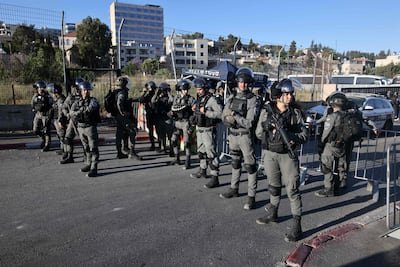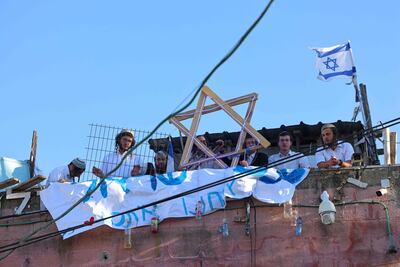Palestinian families are living in limbo as the conclusion of a long-running legal battle against their eviction from East Jerusalem's Sheikh Jarrah district draws near.
The fragile truce between Israel and Palestinian militant groups has brought uneasy quiet to the district, where fragrant citrus trees grow in courtyard gardens and cosy terraces overflow with flowering jasmine.
The houses the Palestinians have lived in for nearly 70 years are filled with hand-carved furniture, ornate rugs and traditional embroidery. Maps of historical Palestine hang on the walls of some and the golden Dome of the Rock, in the vicinity of the Al Aqsa Mosque, can be seen from the highest windows.
But Israeli military checkpoints tightly control access to the area and Palestinians say the neighbourhood has now taken on the atmosphere of a militarised zone.
"The Israeli army installed several barriers that arbitrarily limited our right of movement," said Yaara Yaish, a 32-year-old resident of the affluent Al Hara Al Fokaniya lane, named with the Arabic for the high plain.
"Many of us won't leave the area as Israeli soldiers give us a lot of hassle when we come back," she told The National, referring to the checkpoints that Israel says are key to maintaining security.
Though the open hostilities have ended, the families' right to live in the district remains threatened by a concerted effort, backed by influential Israeli settler groups, to evict them from their homes.
The eviction threats turned the tiny district into a flashpoint in the latest surge of unrest between Israel and the Palestinians.
The legal battle over the right to live in Sheikh Jarrah culminated in an appeal to Israel's Supreme Court to overturn a verdict from last year in favour of the Israeli settlers.
The Supreme Court discussed the case in two sessions on April 30 and May 2 this year.
A third session that was due to take place on May 10 was cancelled as tensions sparked the worst violence seen in the Palestinian territories and Israel since 2014.
The Justice Ministry plans to schedule a new hearing within weeks.
If the Supreme Court appeal is successful, the families could gain long-sought recognition from Israel of their right to live in Sheikh Jarrah. If it fails, then they will lose their homes.
The eviction proceedings in the case that will again appear before the Supreme Court, as well as similar previous cases in occupied East Jerusalem, are based on the application of two Israeli laws, the Absentee Property Law and the Legal and Administrative Matters Law of 1970.
International rights groups say the Israeli authorities have largely allowed the takeover of the land and homes of Palestinians, in East and West Jerusalem, who left or were expelled as a result of the 1948 conflict or fled the Israeli occupation in 1967, by declaring them “absentees' properties”.

Legal limbo
The last seven months have been exhausting for the 78 members of 19 Palestinian families facing eviction and displacement from what they insist are their homes and lands.
The families do not enjoy the same legal and social rights as some of their neighbours, however.
If the Palestinian residents of East Jerusalem leave the holy city for more than six years for any reason – including to study or work – they will not be allowed to return.
If they move to live outside the district’s municipal boundaries, even to nearby cities in the West Bank like Ramallah, they lose their blue resident IDs issued by Israel.
Salah Abu Hussein has been defending Palestinian families in the area since 1994. He told The National how he and his team scoured archives for Ottoman-era documents supporting the families' right to live in Sheikh Jarrah.
“We visited Turkey four times and searched the Ottoman archives and found nothing supporting the claims of the Israeli settlers that the land was owned by two Ashkenazi and Sephardic Jewish settler groups in the 19th century. We have copies of the relevant archival materials and have presented them to the Israeli Supreme Court,” he said.
"The first lawsuit filed by Jewish plaintiffs to displace Palestinian families dates back to 1972," said Mr Abu Hussein. Most of the Palestinian families in Sheikh Jarrah have been stuck in legal limbo since the 1970s.
The Palestinian families in the current case say their predecessors were unable to register the land in Sheikh Jarrah in their names in the 1950s when they were resettled there by Jordan in conjunction with the United Nations Relief and Works Agency for Palestine Refugees (UNRWA). At the time, East Jerusalem and the West Bank were under Jordanian control.
Up to 700,000 Palestinians fled or had been driven from their homes in several towns and cities that constituted historical Palestine and became Israel in 1948-49. Both sides of the conflict have been blaming each other since then.
When Israel seized East Jerusalem after the 1967 war, Sheikh Jarrah came under Israeli control.
“Then the Israeli authorities refused to register the land in Palestinian names as Israel fully administered East and West Jerusalem in 1967,” said Mr Abu Hussein.
The Palestinian lawyer says that, in the early 1970s, an Israeli lawyer hired by the Palestinians to defend them against the threat of eviction was accused by his Palestinian clients of exploiting an ad hoc power of attorney arrangement to give Jewish settler groups landlord status over the Sheikh Jarrah families, who then became protected tenants.
‘The law is on our side’
The Israeli settlers claim the evidence supporting the Palestinian case is flawed and their lawyers are determined to slug it out.
"They are spreading lies to influence innocent and ignorant minds," Chaim Silberstein, the president of the advocacy group Keep Jerusalem, told The National.
“The Israeli courts sent the Ottoman title deeds to the forensic department to check their authenticity and the forensic department returned the documents and said they were completely forged. The ink was recent and the stamps on the documents were not of the period that they claim to be,” said Mr Silberstein, who is also a councillor for the Beit El settlement in the occupied West Bank.
Israel cites historical and religious ties in its claim to the land of the West Bank, and around 650,000 Jewish settlers live there among three million Palestinians.
Mr Silberstein rejects the term settlement, calling Beit El a Jewish community in Judea and Samaria.
“This land is holy for Jews,” he said, referring to Sheikh Jarrah. “There’s the tomb of high priest Simeon the Just – Jews have been visiting it for thousands of years.”
Since 1967, about 250 Israeli settlements have been established across the West Bank, including East Jerusalem, in contravention of international law, the UN says.
Mr Silberstein said two Jewish settler groups purchased four acres of land around the tomb from the original Turkish landowners in 1875.
“The original acquisition has been challenged in courts and upheld many times,” he said.
Mr Silberstein claimed many of the settlers had reclaimed properties that were being illegally occupied by what he called squatters.
“The legal status of this case is that the Arab tenants of these properties have been living there illegally. They have been offered compensation to leave or to pay rent. They have refused those offers and, as a result, they are no longer eligible to live in those homes as they have lost their rights by their own failure. They had an opportunity to remain but refused. The law is on our side.”
‘Mission impossible’
Israel regards all of Jerusalem as its capital, citing historical and religious ties to the land, but the Palestinians claim East Jerusalem as the capital of a future state.
Last year, former US President Donald Trump recognised Jerusalem as the capital of Israel, upsetting many allies in the region and the West alike.
A video that was widely shared in May on social media recently by Palestinian residents showed the argument between Muna El Kurd, whose family faces eviction and displacement in the ongoing case, and a Jewish settler from New York, who lives in half of her house after a Jewish settler group won a legal battle in 2009.
The man was standing in the garden of the house in defiance of the protests by Ms El Kurd.
The UN says the Palestinian families in Sheikh Jarrah are refugees who lost both their original homes and means of livelihood as a result of the 1948 conflict.
“In 1956, these refugee families moved into Sheikh Jarrah with the support of the Jordanian government and material assistance from UNRWA following their displacement. They have resided in these homes for nearly 70 years. They are now at risk of being displaced for the second time in living memory,” UNRWA said.
“The evictions, if ordered and implemented, would violate Israel's obligations under international law.”
Israel has frequently characterised the legal battle over Sheikh Jarrah as a property dispute.
In a statement on May 9, the Israeli Foreign Ministry said: "Regrettably, the [Palestinian Authority] and Palestinian terror groups are presenting a real-estate dispute between private parties, as a nationalistic cause, in order to incite violence in Jerusalem.”
But Suhad Bishara, the director of the Land and Planning rights unit of the Palestinian advocacy group Adalah, said the great religious significance of Jerusalem to Judaism, Christianity and Islam means this is not the case.
Israel, she said, cannot impose its own set of laws in occupied territory, including East Jerusalem, to evict Palestinians from their homes.
“There’s a huge legal imbalance between the Palestinians and Jews in Sheikh Jarrah,” she said.
“Defending yourself against the occupier with the tools the occupier has imposed on you is a mission impossible.”



